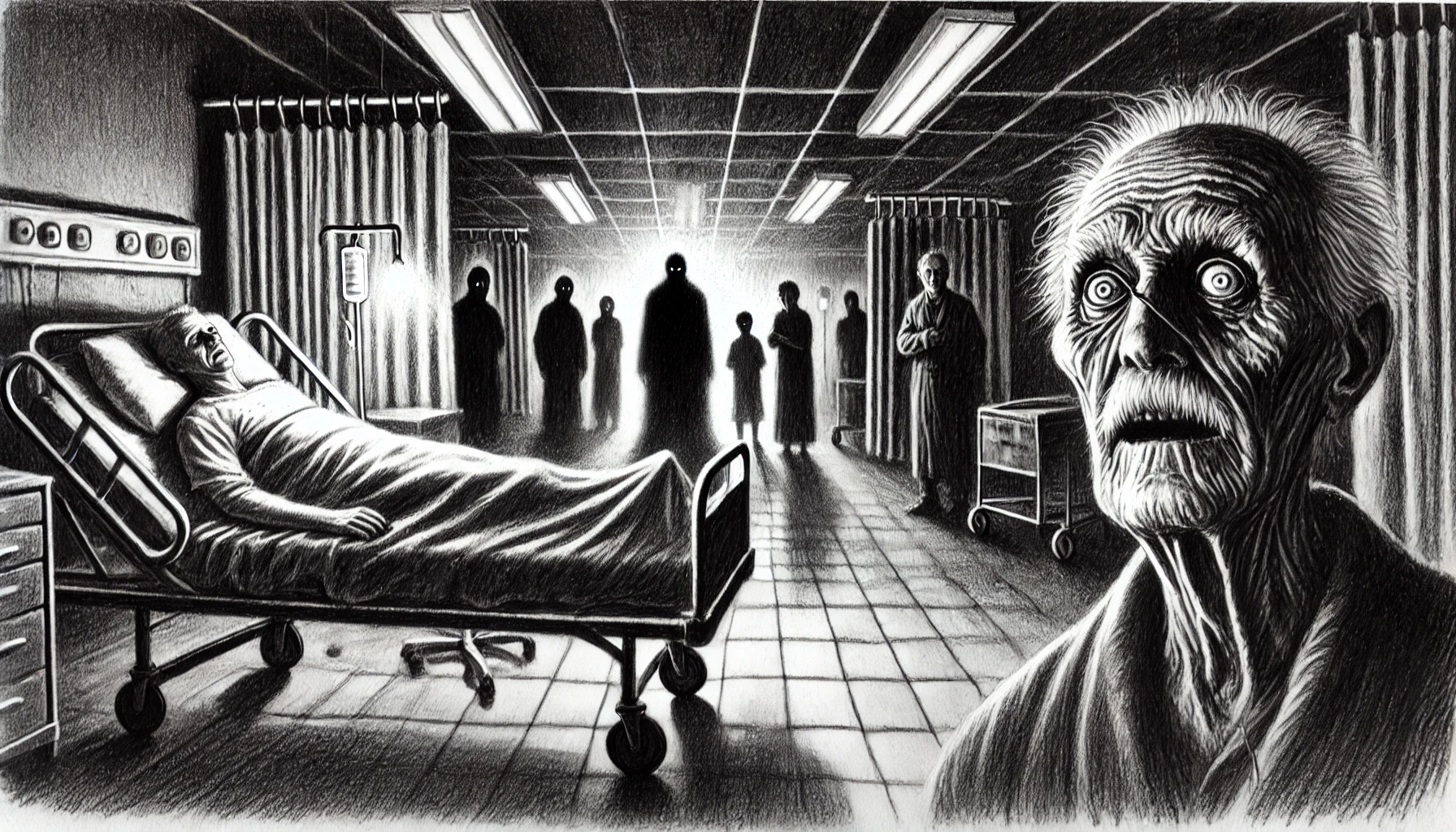I’ve seen death many times. You get used to it working in hospice. There’s a pattern to it, like the soft ticking of a clock. Time winding down, second by second, until—stop. It’s not usually a violent thing. Most people slip away quietly, surrounded by family, love, or at least some semblance of peace. But not him.
I’ll never forget that night.
It was just past midnight, my shift dragging on, when I got the call. Mr. Gregson, Room 402, was nearing the end. I’d been expecting it. He’d been on the brink for days, lingering as if refusing to let go. The family had been called in earlier, filling that small room with tense, exhausted faces. They weren’t here out of love. It was obligation, duty. “Honor thy father” and all that. But love? No. There was none of that.
I walked down the hall, my shoes squeaking against the linoleum floor. It was quiet—the kind of quiet that creeps under your skin and makes your pulse quicken for no reason at all. I was tired, yeah, but there was something else. Something that made my stomach knot as I pushed open the door to Room 402.
Inside, the air was thick, almost oppressive. The family was huddled around the bed—four of them, staring at the man who had given them nothing but pain. His daughters stood off to the side, arms crossed, eyes distant. His son, the eldest, sat closest to him, his jaw tight. They hadn’t said much since they arrived, just the usual complaints about how he’d been a terrible father—a narcissist, a drunk, a cheater. They weren’t here for him. They were here because it was what they believed they should do.
The man in the bed, Mr. Gregson, lay there, pale and gaunt. His breaths were shallow, uneven. His eyes were closed, his body still. For now.
I checked his vitals, adjusting his meds to keep him comfortable. I tried to be discreet about it, but his son noticed.
“How much longer?” he asked, voice low.
I didn’t answer right away, just glanced at the clock. Time was running out. “Not long,” I said softly.
The family exchanged glances, but no one said anything. It was strange—most people have something to say in those last moments. They reminisce, they cry, they try to find peace. But not them. Not this family. It was as if they were waiting for something else entirely.
And then it started.
At first, it was subtle—just a flicker of the overhead lights. I glanced up, frowning, but they steadied again. It wasn’t unusual. Old building, old wiring. But then the temperature dropped. Not the kind of chill that happens when someone turns down the thermostat. No, this was something deeper. Colder. The air felt… heavy, like it was pressing down on my chest.
Gregson’s breathing changed. It grew ragged, more labored. His eyes, once closed, shot open wide, staring at the ceiling with a kind of terror I’d never seen before.
And then he screamed.
It was a sound so raw, so primal, that it sent a jolt of fear through me. His whole body convulsed, his hands gripping the sheets with unnatural strength as he thrashed against the bed.
“No! No! I’m not going!” His voice was hoarse, desperate.
The family jumped to their feet, shocked, not knowing what to do. His son reached for him, trying to calm him down, but it was no use. Gregson wasn’t hearing any of us. His eyes were locked on something we couldn’t see. Something standing at the foot of his bed.
I felt it then. The presence. It was like the room had filled with something dark, something ancient. The lights flickered again, this time more violently, casting strange, jagged shadows across the walls. Shadows that seemed to move on their own.
Gregson’s daughter gasped, stepping back, her eyes wide with fear. “What the hell is happening?” she whispered.
I didn’t answer. I didn’t know how to. All I knew was that whatever was in that room with us—it wasn’t human. And Gregson, well, he knew it too. He was screaming again, begging.
“Please! I’m not ready! Don’t take me! Please!”
The lights surged, flickering so fast it made my head spin, and then—darkness.
For a moment, there was nothing. Just the sound of Gregson’s frantic breathing, his raspy gasps for air. And then the lights snapped back on, steady, cold, illuminating the room in harsh fluorescent light.
Gregson was silent. His chest heaved once, twice, then stopped. His eyes, still open, stared blankly at the ceiling, but whatever terror had gripped him moments before—it was gone. He was gone.
The family stood frozen, staring at his lifeless body, unsure of what they had just witnessed. I felt my heart racing in my chest, my hands shaking as I stepped back, trying to make sense of it. But there was no making sense of it. Not really.
The son finally broke the silence. “What the hell just happened?”
I didn’t know what to say. How do you explain the unexplainable? How do you tell a family that their father, their cold, unrepentant father, hadn’t just passed peacefully into the afterlife—that he had been dragged into something far darker?
I took a deep breath, trying to steady myself. “He’s gone,” I said quietly, because it was the only truth I had to offer.
But in my heart, I knew. Gregson hadn’t just died. He’d been taken. And whatever had come for him… it hadn’t been from heaven.
As I left the room, I glanced back one last time. The lights were steady now, the shadows gone. But the cold—the cold still lingered.
And somehow, I knew it always would.




